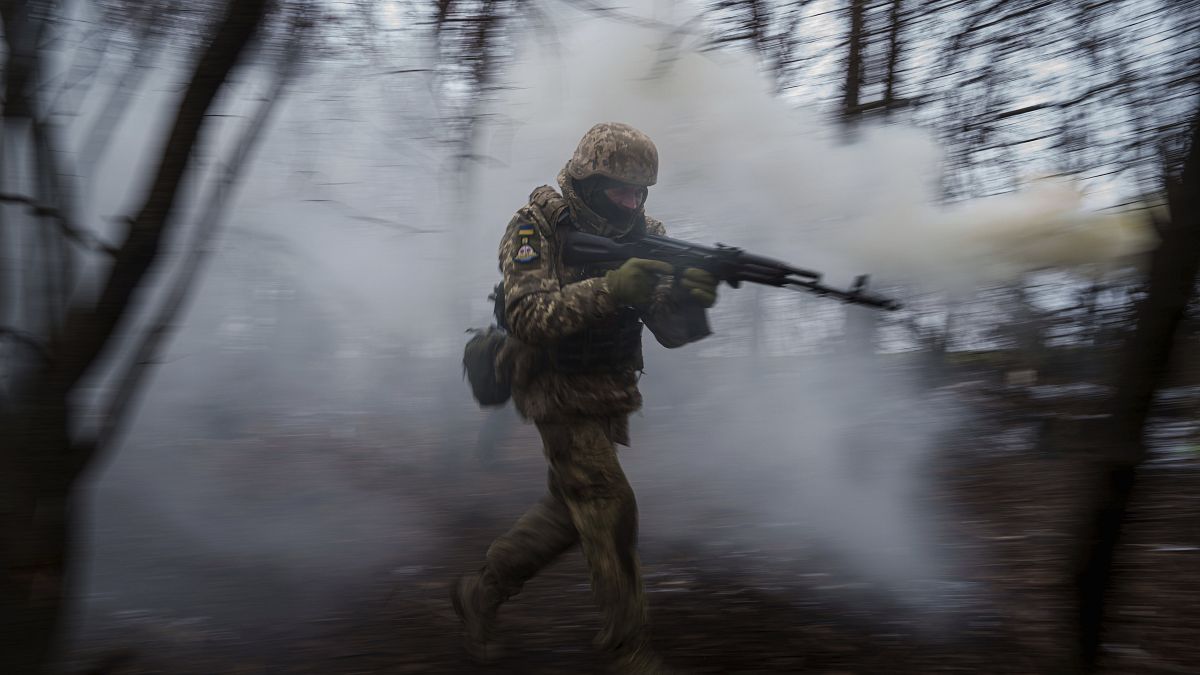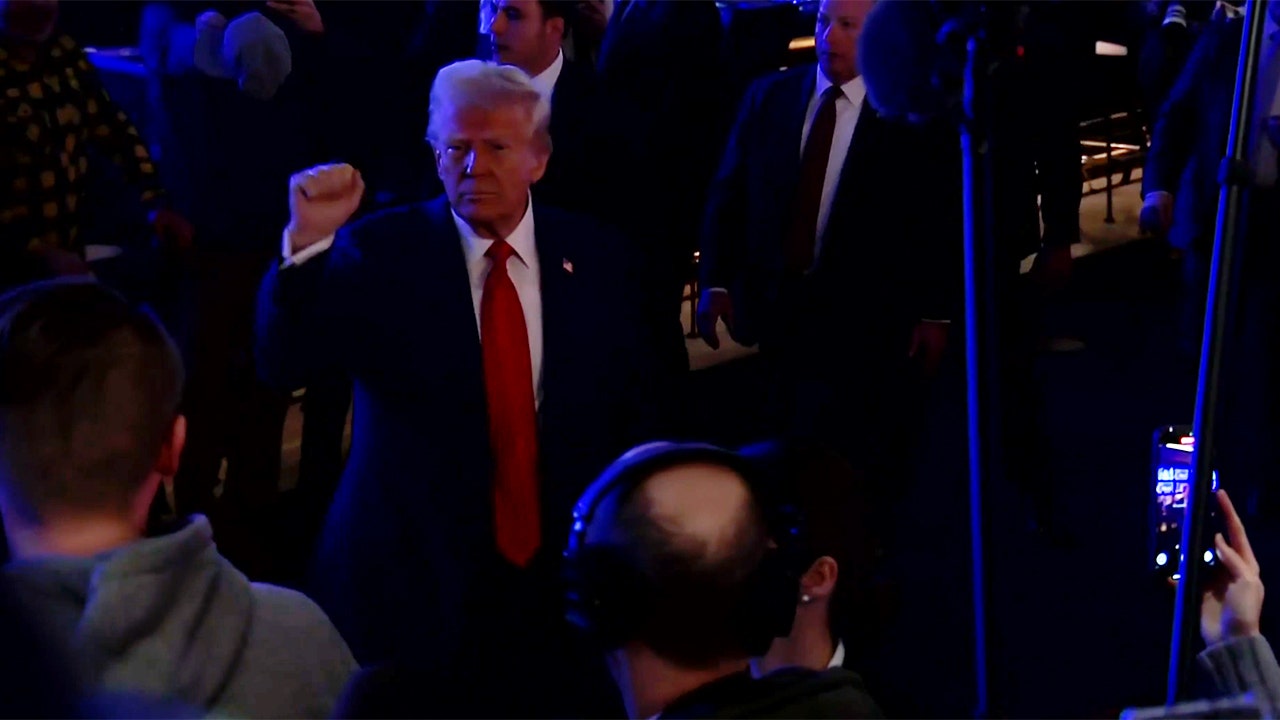Sports
Dominican basketball player who previously blamed COVID vaccine for rare heart condition dies of heart attack
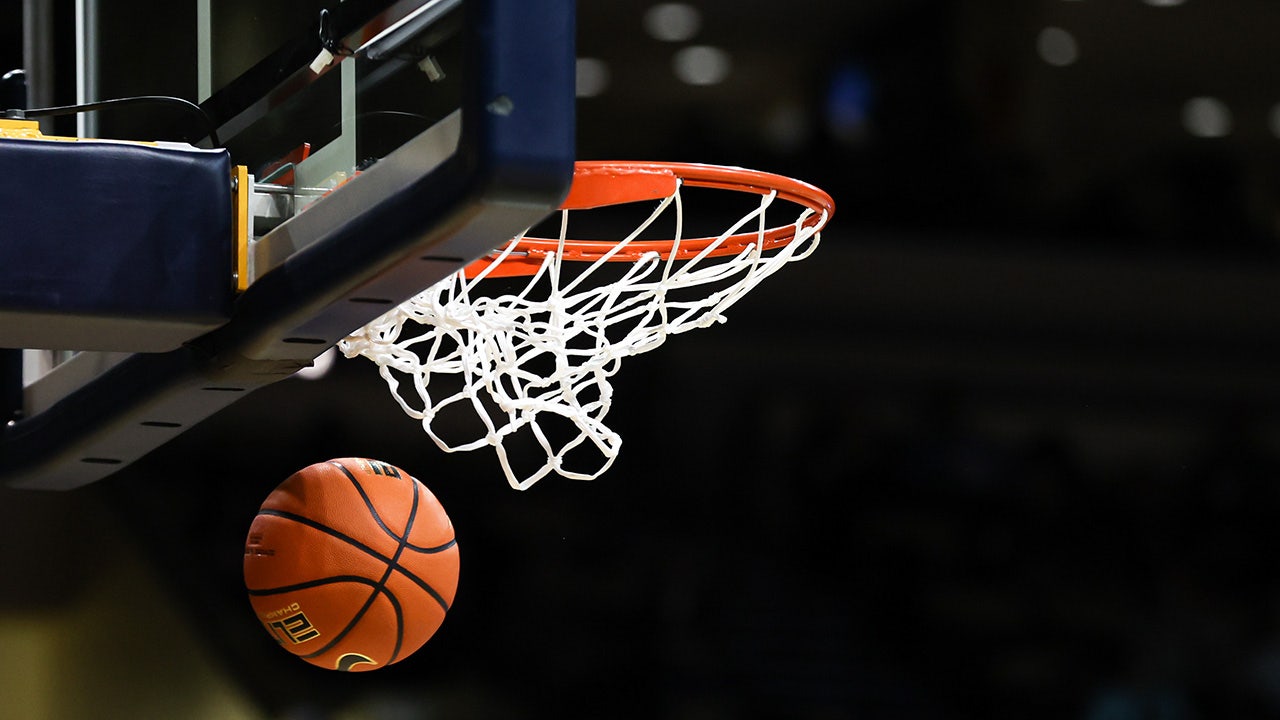
Professional Dominican basketball player Óscar Cabrera Adames died this week after an apparent heart attack while he was possibly undergoing a stress test.
According to a social media post from Dominican sports commentator Héctor Gómez, the 28-year-old’s stress test was being performed at a health center in Santo Domingo.
Cabrera Adames is believed to have suffered from myocarditis. The disease can weaken the heart and its electrical system, which decreases the heart’s ability to pump blood, according to the American Heart Association.
A ball going through a hoop and net during the third quarter of a Mid-American Conference women’s basketball game between the Miami (Ohio) RedHawks and the Toledo Rockets Jan. 25, 2023, at Savage Arena in Toledo, Ohio. (Scott W. Grau/Icon Sportswire via Getty Images)
Following his death, social media posts surfaced in which Cabrera Adames suggested he developed the rare heart disease after he received two doses of a COVID vaccine.
“I got a damn Myocarditis from taking a f—ing vaccine. (I got 2 doses of Pfizer) And I knew it! Many people warned me,” Cabrera Adames wrote on social media.
RISING MMA STAR CRIS LENCIONI IN ICU AFTER CARDIAC ARREST; FAMILY SAYS HE’S ‘IN HIS BIGGEST FIGHT YET’
He also said the vaccine was a work requirement.
“But guess what? It was compulsory or I couldn’t work. I am an international professional athlete and I am playing in Spain. I have no health problem, nothing, not hereditary, no asthma, NOTHING! I suddenly collapsed to the ground in the middle of a match and almost died. I’m still recovering and I’ve had 11 different cardiology tests done and guess? They find nothing.”
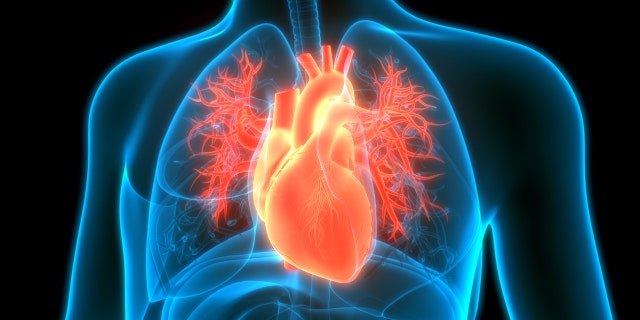
3D illustration concept of the human circulatory system and heart anatomy (iStock)
Cabrera Adames’s collapse happened during a 2021 Spanish Amateur Basketball League game. He fainted during the game and was later transported to a hospital on a stretcher.
According to the Mayo Clinic, a stress test is designed to show how the heart functions during physical activity. Medical personnel usually attach electrodes to the patient’s chest during the test. A machine then records the electrical activity of the heart.
It remains unclear if the stress test was the direct cause of Cabrera Adames’ heart attack.
Cabrera Adames was the nephew of Hugo Cabrera, a Dominican Sports Hall of Famer.
Cabrera Adames played basketball at Daytona State College in Florida. In 2016, he was one of 12 men arrested by St. Johns County Sheriff’s deputies for allegedly attempting to have sex with a minor.
The undercover sting was formed to catch individuals who intended to use the internet as a tool to find children to sexually exploit, law enforcement said at the time.

Sports
James Harden scores 40 as Clippers pull off impressive win over Bucks

The Clippers knew their top-notch defense would be stretched by a Milwaukee Bucks team led by NBA All-Star Giannis Antetokounmpo. They knew their stellar defense would be tested by one of the best shooting teams in the NBA, a squad riding a five-game winning streak.
The Clippers were resolute in the face of those challenges, pulling out an impressive 127-117 win over Milwaukee on Saturday at the Intuit Dome.
James Harden scored 17 of his game-high 40 points in the third quarter, his hot shooting helping the Clippers open a one-point lead heading to the fourth. Harden is one of six players in the NBA to have at least three 40-point games this season.
Norman Powell was on the attack all game, scoring 33 points. It was his eighth 30-plus point game this season, a career best. Kawhi Leonard continued to play limited minutes in his return from a knee injury, scoring 18 points in 24 minutes.
Antetokounmpo lived up to the billing of being one of the league’s best players, a player who entered the game second in scoring (31.3 points per game) and fifth in rebounding (12.0). He had 36 points and 13 rebounds against the Clippers.
The Clippers (26-19) are ranked third in the NBA in defense, holding teams to 106.6 points per game, second in defensive rating at 107.1 and fifth-best in field-goal percentage at 45%.
They put that up against the Bucks team that was sixth in shooting from the field (48.3%) and second in three-point shooting (39%).
The Bucks (25-18) have one of the league’s best three-point shooters in Damian Lillard, who had a triple-double with 29 points, 10 assists and 10 rebounds.
Sports
How the Buffalo Bills’ underdog story made them America’s team: ‘The people around us rally with it’

ORCHARD PARK, N.Y. — During the Buffalo Bills’ playoff drought, ESPN anchor Kevin Connors used to have a running joke on air. Connors, a lifelong Bills fan from Long Island, would refer to the Bills as America’s Team. It would elicit a laugh from his co-anchor, one baked in sympathy for Connors and the other fans enduring the slog of 6-10 and 7-9 seasons.
Now, though? Connors looks like he was on to something.
“They really have kind of become America’s team,” Connors said this week ahead of Buffalo’s latest playoff clash with the Kansas City Chiefs.
“America loves the story of it. America loves an underdog, but I think they really respect a team that has been there, was bad forever, built it up, gotten pretty good and just keeps getting up off the mat. There’s a level of respect for that.”
It’s not easy to quantify the country’s rooting interest in any particular postseason. BetOnline attempts to do so based on geotagged data from X posts to see how many posts with the official team hashtags are coming from each state. Earlier in the playoffs, their data showed that half of the states in the country were rooting for the Detroit Lions, another franchise that hasn’t ever reached the mountaintop. But the Washington Commanders, a feel-good story in their own right, eliminated the Lions last week. The other remaining NFC team is the Philadelphia Eagles, a team that has won a Super Bowl recently and has a fan base that doesn’t have the coziest reputation. And then there’s the Chiefs, who have won two straight Super Bowls and been to three of the last four. The Bills are the only team left in the field without a Super Bowl win.
When BetOnline re-ran the data after the conference championships were set, it showed two-thirds of the country is pulling for the Bills. That’s not an exact science, but it makes anecdotal sense.
“People get tired of seeing the same thing over and over,” said Bills guard Conor McGovern, who played for the Dallas Cowboys, the team traditionally referred to as America’s team. “That’s probably why people are rooting for us. They see us as the underdog.”
The Bills aren’t exactly David against Goliath. They’ve been to the playoffs six straight seasons, won a playoff game in five straight seasons and have three 13-win seasons in their last six. Josh Allen is one of the best quarterbacks in the league and arguably the most exciting to watch.
GO DEEPER
Will Chiefs-Bills smash NFL TV viewership records? Here’s why it could
But this is also a team and a fan base that has been repeatedly kicked in the shins. Forget about the four straight Super Bowl losses in the 1990s or even the 17-season playoff drought, both gut-wrenching in their own ways. Throw out the fact that this region, one of the smallest markets in professional sports, has never experienced a Super Bowl or a Stanley Cup championship. Even without that history as a backdrop, this version of the Bills has built up its own scar tissue. As the Bills became a fixture in national television games in recent years, their lowest moments were on display for the football-watching public. The football world felt the collective anguish of a fan base during Buffalo’s 13-seconds loss to Kansas City. Home playoff losses to the Cincinnati Bengals and Chiefs in the divisional round the last two seasons have made it easy for people outside of Buffalo to wonder how fans keep getting back up.
And all of that on-field sorrow seems trivial when you consider the non-football adversity the team and community have endured. In 2022, the country rallied around the Bills when Damar Hamlin collapsed on the field and nearly died. That same year Buffalo endured tragedy when a racist shooter murdered 10 people and wounded three others at a supermarket in the city’s east side. A devastating Christmas blizzard left 47 people dead in 2022. Too often, the country’s window into Buffalo is centered around struggle.
The Bills have a chance to change that like they did for three hours on Sunday during a thrilling divisional round win against the Baltimore Ravens. More than 42 million people tuned in for what turned into a party at Highmark Stadium. Fans who had been in the parking lots tailgating since the early morning hours finished their night with a vintage Buffalo celebration first in the stadium and then in those same parking lots.
Earlier that week, a Baltimore radio personality called Buffalo, “a city of losers.” After the game, Bills coach Sean McDermott gritted his teeth at the mention of it and delivered an impassioned defense of his adopted hometown.
“It’s a city of winners, it really is,” he said. “These people in this town are winners. I’ve been here just eight years but I consider this my hometown. This place is different and the people here are different. They deserve more than whoever said that about them.”
“Buffalo is a city of winners and the people here are different.” ❤️💙#GoBills | #BillsMafia pic.twitter.com/Lny6lLl70S
— Buffalo Bills (@BuffaloBills) January 20, 2025
Bills safety Micah Hyde started this season on the outside looking in while pondering his playing future. Sitting at home in San Diego gave him a different perspective on how much people outside of Buffalo are pulling for the Bills.
“I think it’s been like that for a while now,” Hyde said. “We’ve been so close to getting over the hump.”
Hyde has also seen this story evolve. He arrived in 2017 as one of the first signings in Sean McDermott’s tenure as head coach. He’s been through every high and low with this regime. He made his career and a home away from home here. And this season, he decided to return as a member of the team’s practice squad to do whatever he could to help this team get across the finish line. Hyde’s son likes to watch highlight videos of his dad before he goes to bed. And those videos make it hit home for Hyde just how far the Bills have come.
“There were some highlights from 2017, it was a home game and there was hardly anybody in the stands,” Hyde said. “To see the organization from where it was to where it is now, it’s two totally different things and it’s honestly really cool to see. That’s why I felt like coming back was a no-brainer. I wanted to be a part of this. I was able to see it from when it was, honestly, a dumpster fire, it was terrible when we first got here, to where it is now. We’re one of the pinnacle places in the league to be a part of.”
Buffalo as one of the pinnacle places in the NFL is more than lip service to the players in the locker room. The word love is frequent in players’ vocabulary. Love for each other. Love for the game. And love for the community.
“We’re literally like the core of the community,” McGovern said. “It’s all intertwined here. I don’t think there’s a better thing in football than that.”
Or as Hyde put it, “It’s a homegrown team. Everyone sees it as an organization run by good people with good people in the organization, a very good quarterback and a small-town kind of feel. This is America in a nutshell if you want to talk about it.”
Defensive tackle Jordan Phillips is on his third stint with the Bills. His first was in 2018 and 2019. He came back in 2022 for two seasons. Most recently, he started this season with the Cowboys and was released in November. The Bills picked him up. Every time it’s been a no-brainer to return.
“It’s everything,” Phillips said. “It’s all the appreciation you get. I can do what I want to do. I can wear my coat out there. It’s just fun. The people around us rally with it. Why wouldn’t you want to come back? Why wouldn’t you want to be a part of this? The destination wasn’t so much of a destination but now it is. I think that’s the best way to say it. That speaks to the team and the community around it. When you come here you’re like, ‘S—.’ But when you’re here, you’re like, ‘Oh yeah, this is it.’”
Phillips would know about destination cities. He’s played in some of the league’s biggest markets like Arizona, Miami, New York and Dallas. The more he bounced around, though, Phillips realized how much different Buffalo is. The weather and the nightlife don’t make a destination. In those bigger places, Phillips said there was almost too much other stuff to do and teammates didn’t all live close together. Hanging out away from the facility was rare. In Buffalo, there’s stuff to do but it’s usually stuff the team is doing together.
“You have a bigger bond,” Phillips said. “It’s college vibes. It takes special people and special management to be able to build something like this. Because even before Sean and them got here it wasn’t like this. It does take the people but once you get the right people and the right personnel to buy into what you’ve got going and then you’ve got an MVP quarterback, this is what you can get.”

GO DEEPER
‘I couldn’t believe it’: Josh Allen’s best plays this season, according to his Bills teammates
This week, as Allen was speaking to reporters, mounds of snow left behind by another lake-effect snowstorm were behind him on the practice field. The temperature dipped and had approached zero. That weather may deter some players from entertaining Buffalo, but it’s helped this group of players find their identity individually and collectively.
“It’s kind of hard to put into words but typically when people think of Buffalo they think of what’s going on right now with the snow and the cold,” Allen said. “You have to be pretty tough to be in a place like this. We feel like we have guys in this locker room that maybe haven’t gotten all the recognition they deserve, coming here on the last leg of their career and just coming here trying to prove something to not just the world but to themselves.”
That’s part of what makes it believable to think two-thirds of the country could be pulling for the Bills the rest of the way. But even if so many people are behind them, that doesn’t change the underdog feeling the Bills are trying to harness. Phillips quickly pointed out the lack of Bills on the All-Pro and Pro Bowl teams. In his eyes, Buffalo will never get the recognition it deserves.
“That’s not what this is about here,” he said. “It sucks because guys don’t get the national attention that they deserve. But the community gives you so much more. You’re loved here, you know what I’m saying? It’s almost like you’re legends damn near. At the end of the day, that’s all you really need.”
A lot of players on the Bills mention that they’ve deleted social media. So they don’t necessarily notice how much the bandwagon might be filling up. They also know it has a lot to do with the simple fact that the Chiefs have won. Repeatedly. Some fans may complain about the perception that the Chiefs get favorable calls or that Taylor Swift appears on the broadcast too often. But the root of it all is the Chiefs have been standing in the way of the entire league.
Bills tight end Dawson Knox is a Star Wars fan, so he smiled at the comparison of the Chiefs to the Evil Empire.
“We’ll take the extra fans but our fan base as it is we don’t need to add anybody else to make us feel good,” Knox said. “I always view us as the good guys and them as the bad guys, whoever we’re playing.”
During a meeting before the Bills’ game against the Ravens, coaches showed a video of talking heads disparaging the Bills for one reason or another. They leaned heavily on the underdog role. External motivation shouldn’t be needed this time around. Despite a 4-1 record against the Chiefs in the regular season since Allen and Patrick Mahomes took over, Buffalo is 0-3 in the playoffs against Kansas City. That, and a potential trip to the Super Bowl, are motivation enough.
“It’s like when you’re a little kid and you’re tired of your big brother beating your ass all the time,” Phillips said. “If you want to be the king you have to take the kings out.”
Regardless of how it ends, it’s clear this Bills team isn’t the same one Connors used to jokingly call America’s Team on SportsCenter. This version is the real deal.
“It’s hard to get around it,” Phillips said. “In the coming years, especially when the new stadium is built, it’s going to be like, ‘We’re here.’”
(Top photo: Kathryn Riley, Steven King, Timothy T. Ludwig / Getty Photos)
Sports
Riley Gaines tears into WNBA star who gave Caitlin Clark black eye for wearing anti-Trump shirt
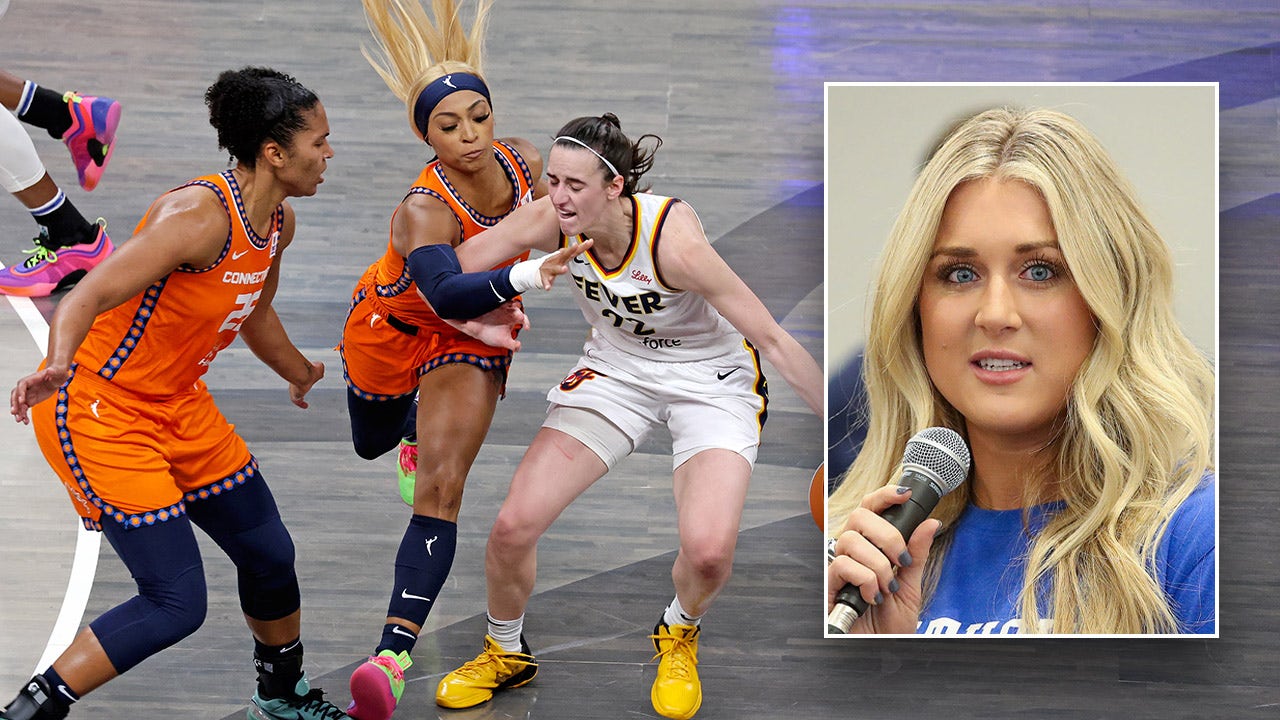
WNBA player DiJonai Carrington invited a flurry of backlash for wearing a shirt that said “The F— Donald Trump Tour,” and conservative influencer Riley Gaines was quick to jump in.
Carrington showed off the shirt Friday, while walking into Wayfair Arena in Miami, Florida. Carrington is most known for her interactions with women’s basketball phenom Caitlin Clark during Clark’s rookie WNBA season in 2024.
Carrington infamously gave Clark a black eye by poking her with her fingernails during a game between Clark’s Indiana Fever and Carrington’s Connecticut Sun in the first round of the playoffs in September. Carrington laughed with Fever teammate Marina Mabrey after the incident.
Gaines made light of this in her first critique of Carrington Saturday.
“So, you’re telling me the same girl who deliberately gouged Caitlin Clark in the eye then laughed about it also wore a hoodie that said, “The F— Donald Trump Tour”?! I’m shocked,” Gaines wrote in a post on X.
Carrington has said she didn’t intentionally poke Clark in the eye and that she wasn’t laughing about the incident. But Gaines felt no reservations about implying Carrington’s poke at Clark was intentional and that she laughed about it afterward.
Gaines followed up with another critique of the Sun player and even brought LeBron James into the conversation.
“What has Donald Trump done to make your life worse? Keep LeBron off the court,” Gaines wrote on X in response to a photo of Carrington wearing the shirt.
Carrington provoked Clark fans prior to the eye-poking incident with multiple statements berating Clark and her fan base.
During a game in June, Carrington fouled Clark after Clark received an inbound pass from teammate Kristy Wallace. Clark caught the pass and started toward the basket. Carrington was late getting to Clark due to a screen by Aliyah Boston, and she bumped into Clark.
Caitlin Clark, right, of the Indiana Fever, fouls DiJonai Carrington (21) of the Connecticut Sun during the first half at the Mohegan Sun Arena June 10, 2024, in Uncasville, Conn. (Brian Fluharty/Getty Images)
Later that month, Carrington posted on X, saying Clark should do more to speak out about people using her name for “racism” and other forms of prejudice. She also called the Fever fans the “nastiest” in the league.
Carrington even made light of the controversy over Clark’s black eye in an Instagram Live video in October. In the video, Carrington and her girlfriend, NaLyssa Smith, who plays on the Indiana Fever with Clark, were in their kitchen when Smith poked Carrington in the eye.
“Ow, you poked me in the eye,” Carrington said. Smith apologized, and the two laughed.
“Did you do it on purpose?” Carrington asked.
Carrington isn’t the first target of Gaines’ wrath when it comes to conversations about Clark’s presence in the WNBA either.
After Clark made a comment about benefiting from White privilege in the WNBA during her interview for Time magazine Athlete of The Year, Gaines got into a heated back-and-forth with journalist Jemele Hill.
After Gaines posted on X criticizing Clark for making the comments, Hill started the debate and even ended up making it personal.
“You holler all the time about supporting and ‘protecting’ women, and yet the moment that Caitlin Clark expresses appreciation and respect for the Black women in the WNBA (many of whom she grew up watching and idolizing), suddenly you’re acting like a disappointed parent,” Hill wrote.
RILEY GAINES REPEATEDLY TEARS INTO AOC FOR TAKING PRONOUNS OUT OF X BIO AFTER ADVOCATING FOR TRANS ATHLETES
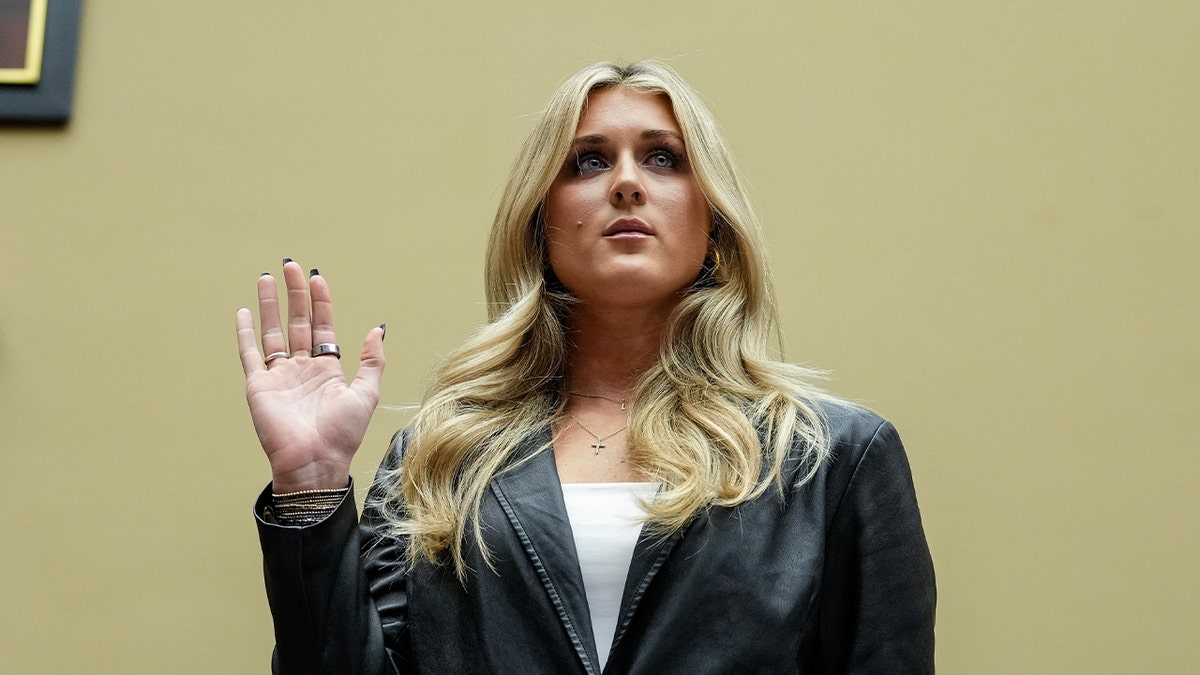
Riley Gaines is sworn in during a House Oversight Subcommittee on Health Care and Financial Services hearing on Capitol Hill Dec. 5, 2023, in Washington, D.C. (Drew Angerer/Getty Images)
Gaines quickly clapped back, responding to Hill’s post by mocking the idea of “White privilege” in the WNBA.
“‘White privilege’ in the WNBA is literally hilarious. Maybe you’re like Sunny Hostin & think CC also has tall privilege, pretty privilege, and straight privilege,” Gaines wrote. “Theres lots of Black players in the WNBA I love [and] respect too, but I don’t admire them because they’re Black. I admire them for their game. That’s the difference.”
Gaines then doubled down by sharing Hill’s initial post with a screenshot of comments the journalist made in an interview with the Los Angeles Times in May. In that article, Hill insisted it was “naive” to say Clark’s race and sexuality as a straight woman did not play into her popularity in the WNBA, where the majority of players are Black and many are lesbian.
“Being a long-standing professional race baiter must be SO exhausting,” Gaines told Hill in response.
After Gaines’ comment about Hill being a professional race baiter, Hill responded with a message mocking the former swimmer for an incident when she tied with trans athlete Lia Thomas at the 2022 NCAA women’s swimming championships.
“Girl, you need to thank Lia Thomas every day of your life for helping you get famous, otherwise you would have been just a decent college swimmer that no one knew. You wrote the book on grifting — not me,” Hill wrote.
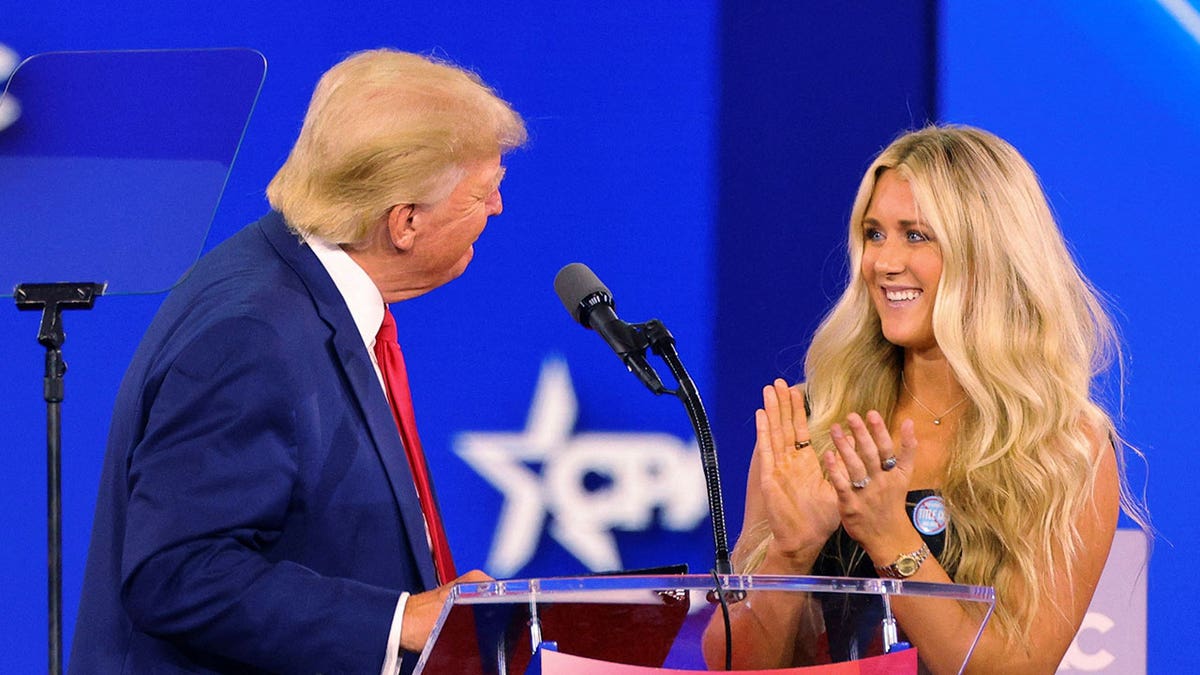
Former President Donald Trump is joined onstage by Riley Gaines at the Conservative Political Action Conference in Dallas, Texas, Aug. 6, 2022. (Reuters/Brian Snyder)
Gaines responded by saying, “How deeply regressive [and] utterly misogynistic for Jemele Hill to tell me to thank a man for the platform I have. Thank him for what? Violating us in the locker room? Stealing a national title from a deserving woman? Indirectly stripping us of our 1A rights? Just say you hate women,” Gaines wrote in her response.
That was the last message in the exchange.
Gaines has also picked online fights with other liberal figures, including Rep. Alexandria Ocasio-Cortez, D-N.Y., and Dallas Mavericks minority owner Mark Cuban.
Each of Gaines’ spats with the liberal figures has been met with roaring engagement from her followers.
Follow Fox News Digital’s sports coverage on X, and subscribe to the Fox News Sports Huddle newsletter.
-
/cdn.vox-cdn.com/uploads/chorus_asset/file/25835602/Switch_DonkeyKongCountryReturnsHD_scrn_19.png)
/cdn.vox-cdn.com/uploads/chorus_asset/file/25835602/Switch_DonkeyKongCountryReturnsHD_scrn_19.png) Technology1 week ago
Technology1 week agoNintendo omits original Donkey Kong Country Returns team from the remaster’s credits
-

 Culture1 week ago
Culture1 week agoAmerican men can’t win Olympic cross-country skiing medals — or can they?
-

 Education1 week ago
Education1 week agoWhat Happened to Enrollment at Top Colleges After Affirmative Action Ended
-

 Culture5 days ago
Culture5 days agoBook Review: ‘Somewhere Toward Freedom,’ by Bennett Parten
-

 Politics1 week ago
Politics1 week agoU.S. Reveals Once-Secret Support for Ukraine’s Drone Industry
-

 World1 week ago
World1 week agoChrystia Freeland, Justin Trudeau’s ‘Minister of Everything,’ Enters Race to Replace Him
-

 Politics1 week ago
Politics1 week agoJohnson Installs Crawford on Intelligence Panel, Pulling It Closer to Trump
-

 News1 week ago
News1 week agoDonation Scams Compound Suffering for Wildfire Victims


